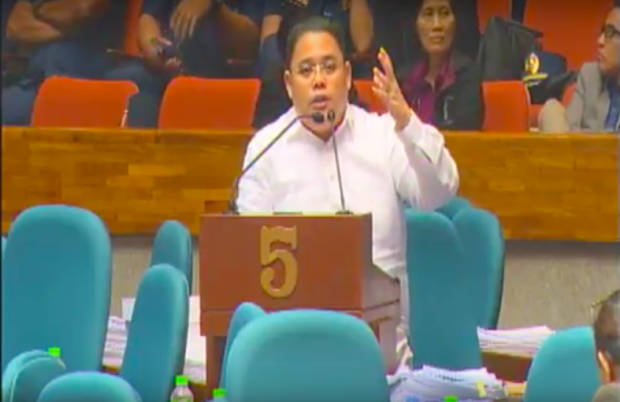Amid human rights worries, solon not allowed to present witnesses

Anakpawis Rep. Ariel Casilao. PHOTO/Screengrab from the House of Representatives’ livestream of plenary debates on the 2018 budget
Even as the year-long extension of martial law has sparked worries about the prolonged violation of human rights, Congress refused to allow Anakpawis Rep. Ariel Casilao to present a Mindanaoan who allegedly fell victim to its “brutality.”
In Wednesday’s joint session, lawmakers did not hear any other resource persons besides the security officials of executive branch who justified the request of President Rodrigo Duterte.
Casilao tried to present Jerome Succor Aba of the Sandugo alliance to speak about the so-called Lake Sebu 8 massacre—referring to eight indigenous T’boli and Dulangan Manobo farmers who were allegedly killed by troops of the 27th and 33rd Infantry Battalion of the Philippine Army and Philippine Marines last Dec. 3.
The day before, his Makabayan party-list bloc filed House Resolution No. 1550, assailing the killing of the lumad farmers they said were resisting the land-grabbing efforts of D.M. Consunji, Inc.
The progressive lawmaker on Wednesday pointed out that the July 22 joint session on the first request to extend martial law featured two resource persons, a Bangsamoro civil society leader and an Army officer who fought in Marawi City.
Article continues after this advertisementHowever, Senate Majority Leader Tito Sotto said many lawmakers complained about the time it took to hear the testimonies.
Article continues after this advertisement“Indeed, there was a precedent in the joint session, that’s why many complained from the Senate and the House of Representatives. There were so many complaints,” Sotto said. “Unless you’re a representative of the district or the people, you can’t speak in the joint session.”
Casilao was forced instead to just ask how the government defined “legal fronts” of the communist rebels which have to be suppressed under martial law.
Defense Secretary and martial law administrator Delfin Lorenzana defined legal fronts as “an organization that is pursuing legal objectives,” which Casilao found “very vague.”
Lorenzana thus told him: “Political dissent per se is not bad. But political dissent in support of an illegal organization like CPP-NPA makes them illegal as well.”
Casilao’s fellow Makabayan member, Gabriela Rep. Emmi de Jesus, also took issue with the vagueness of the term rebellion, and asked if this would apply to civilians protesting the government’s infrastructure projects for pushing them off their lands and depriving them of livelihood.
“If the public fight these [infrastructure] projects because their livelihoods are affected, I would just like to know if you will call this a rebellion if they organize and say they oppose these projects?” she asked.
Lorenzana maintained that martial law was not meant to quash dissent by ordinary citizens and said “we never commit violence against civilians.”
“Civilians who do that, that’s not called rebellion. The rebellion we’re looking for are those who fight the government, bear arms, attack our troops and police…,” he said.
Lorenzana also told Anak Mindanao Party-list Rep. Makmod Mending, who asked about human rights abuses, that “reports of thus hurt have not reached me yet.”
But, Kabataan Party-list Rep. Sarah Jane Elago, of the Makabayan bloc, said the regional human rights coordinator of the Autonomous Region in Muslim Mindanao received “14,000 testimonies of human rights violations” amid the fighting in Marawi City.
She also cited a report by the National Interfaith Humanitarian Mission on five cases of indiscriminate firing, six illegal arrests, and 16 cases of threats, harassments and intimidation by the military.
“Aren’t the abuses of our uniformed personnel, our military, the real threat to public safety? Isn’t that a clear case of terrorism against our countrymen?” Elago said.
Lorenzana also told Anak Mindanao Party-list Rep. Makmod Mending, who asked about human rights abuses, that “reports of those hurt have not reached me yet.”